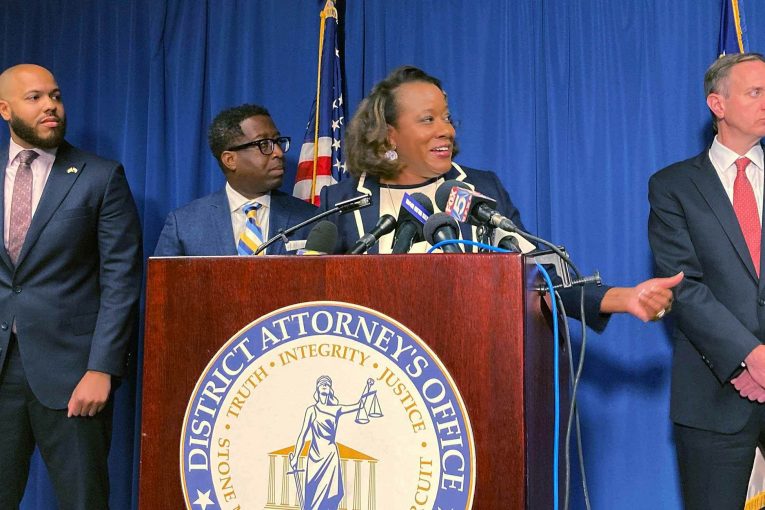

Lawmakers in Georgia are set to force local prosecutors to answer to state politicians, not their voters.
By Sam McCann
Between 2016 and 2020, voters in Georgia elected three prosecutors committed to implementing reforms that build safety and justice, rather than relying on failed “tough-on-crime” policies. But a bill that’s currently before the state legislature would sever the relationship between elected prosecutors and the local communities that put them in office. If passed, the bill could force district attorneys statewide to stick to the failing status quo of mass incarceration—or face removal from office.
In 2016, Sherry Boston was elected district attorney for DeKalb County, which includes part of Atlanta and neighboring cities. Since taking office, Boston has refused to prosecute people for seeking or performing abortions and has used pretrial diversion as an effective alternative to incarceration.  In 2020, voters in neighboring Fulton County, which composes most of Atlanta, elected Fani Willis. Under Willis, the office has charged the police officers who killed Jimmy Atchison, a Black Atlanta man, and is prosecuting former president, and current presidential candidate, Donald Trump for election interference in the state. Also in 2020, voters in nearby Athens-Clarke and Oconee Counties tapped Deborah Gonzalez as their district attorney. Gonzalez has since launched a restorative justice program designed to provide an alternative to incarceration.
In 2020, voters in neighboring Fulton County, which composes most of Atlanta, elected Fani Willis. Under Willis, the office has charged the police officers who killed Jimmy Atchison, a Black Atlanta man, and is prosecuting former president, and current presidential candidate, Donald Trump for election interference in the state. Also in 2020, voters in nearby Athens-Clarke and Oconee Counties tapped Deborah Gonzalez as their district attorney. Gonzalez has since launched a restorative justice program designed to provide an alternative to incarceration.
All three prosecutors are implementing the kinds of policies and practices they promised on the campaign trail, and which led their communities to appoint them. Boston has already won reelection once, in 2020, and all three are due to be on the ballot again this November.
But rather than trusting voters to decide how their elected district attorney uses their office’s power, state legislators are pushing through a bill that would create an oversight commission to govern all district attorneys statewide. This non-elected commission would have the power to discipline—and even remove—elected prosecutors as it sees fit. And it’s part of a national trend, as so-called “tough-on-crime” legislators attempt to force mass incarceration on communities against their will.
The implications are massive. Such a commission could prescribe exactly how a district attorney should behave. For example, if the district attorney does not prosecute a certain criminalized behavior, like abortion or marijuana possession—which is completely within their power—the commission could remove them from office. On the other hand, if a district attorney pursues cases against people the oversight commission wishes to protect, the commission would have the power to intervene with the prosecution.
Such a commission would be intensely political. The commission would include a group of people entirely appointed by officials in the state legislature’s majority party, as well as by the governor and lieutenant governor. As such, most—if not all—commission members would likely not represent the communities whose elected prosecutors are under disciplinary consideration.
The current bill is a revived version of legislation passed last year that was later blocked by the Georgia Supreme Court. The new bill intends to circumvent those concerns while leaving the structure and intent of the commission otherwise in place. The House version passed last week and the Senate version this week. The two chambers are working to reconcile the two versions of the bill and pass a final version, which the governor is expected to sign in the near future.
But Boston says that that oversight commission is anti-democratic.
“If I make a decision, and the vast majority of my community is unhappy with it, then I fully understand that [voters] might not put me back in this chair,” Boston told Vera last year, when the bill first came before the legislature. “But to have to make a decision that, perhaps, my community is 100 percent in support of, but then a small group of five people not living in my community can think it’s the wrong choice, override my decision, [and take me out of office] . . . that’s not how we should be making decisions.”
Indeed, making decisions this way leaves the public with no say in how to build safety in their own communities, stripping them of the opportunity to implement innovative policies with proven success elsewhere. Diversion programs, for one, are shown to reduce people’s future contact with the legal system while increasing their chances of employment. Restorative justice programs lower recidivism rates and support survivors of crime. And declining to prosecute low-level crimes, like drug possession, shoplifting, and minor driving offenses, actually improves public safety and frees up public resources for community investment.
Voters in Athens-Clarke, DeKalb, Fulton, and Oconee Counties chose these district attorneys, often by overwhelming margins, precisely because they were offering alternative approaches to public safety. The proposed commission would instead leave them stuck with the same, tired strategies that bolster mass incarceration and its harms. Why is the Georgia General Assembly denying communities the chance to use the best tools they have?
Georgia is not alone: since 2017, 17 states have tried to pass bills that undermine prosecutorial reforms. Some efforts, like a Texas bill that passed last year, have already become law. In the face of such dangerous legislation, lawmakers nationwide need to reject bills that would limit prosecutorial discretion. Communities should not be bound to the damaging status quo that is mass incarceration—particularly when they have already chosen a better alternative.
Originally published by Vera Institute of Justice





